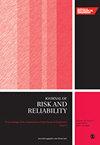Reliability analysis of complex multi-state system based on universal generating function and Bayesian Network
IF 1.8
4区 工程技术
Q3 ENGINEERING, INDUSTRIAL
Proceedings of the Institution of Mechanical Engineers Part O-Journal of Risk and Reliability
Pub Date : 2023-05-12
DOI:10.1177/1748006x231173301
引用次数: 0
Abstract
In the complex multi-state system (MSS), reliability analysis is an important research content, both for equipment design, manufacturing, operation and maintenance. Universal Generating Function (UGF) is an essential method in reliability analysis, which efficiently obtains system reliability by a fast algebraic procedure. However, when structural relationships between subsystems or components are unclear or without explicit expressions, the UGF method is difficult to use or not applicable at all. Bayesian Network (BN) has a natural advantage in terms of reliability inference for the relationship without explicit expressions. When the number of components is extremely large, though, it has the defects of low efficiency. To overcome the respective shortcomings of UGF and BN, a novel reliability analysis method called UGF-BN is proposed for the complex MSS. In the UGF-BN framework, the UGF method is first used to analyze the bottom components with a large number. Then probability distributions obtained are taken as the input of BN. Finally, the reliability of the complex MSS is modeled by the BN method. This proposed method improves the computational efficiency, especially for the MSS with a large number of bottom components. Besides, the aircraft reliability-based design optimization based on the UGF-BN method is further studied with budget constraints on mass, power, and cost. Finally, two cases are used to demonstrate and verify the proposed method.基于通用生成函数和贝叶斯网络的复杂多状态系统可靠性分析
在复杂多状态系统(MSS)中,可靠性分析是设备设计、制造、运行和维护的重要研究内容。通用生成函数(UGF)是可靠性分析中的一种重要方法,它通过快速的代数过程有效地求得系统的可靠性。然而,当子系统或组件之间的结构关系不清楚或没有明确的表达时,UGF方法很难使用或根本不适用。贝叶斯网络(BN)对于没有显式表达式的关系具有天然的可靠性推断优势。但当元件数量非常大时,存在效率低的缺陷。针对UGF和BN各自的不足,提出了一种新的复杂MSS可靠性分析方法——UGF-BN。在UGF- bn框架中,首先采用UGF方法对数量较大的底层成分进行分析。然后将得到的概率分布作为BN的输入。最后,采用BN方法对复杂MSS的可靠性进行了建模。该方法提高了计算效率,特别是对于具有大量底层分量的MSS。在质量、功率和成本预算约束下,进一步研究了基于UGF-BN方法的飞机可靠性优化设计。最后,通过两个实例对所提出的方法进行了验证。
本文章由计算机程序翻译,如有差异,请以英文原文为准。
求助全文
约1分钟内获得全文
求助全文
来源期刊

Proceedings of the Institution of Mechanical Engineers Part O-Journal of Risk and Reliability
ENGINEERING, MULTIDISCIPLINARY-ENGINEERING, INDUSTRIAL
CiteScore
4.50
自引率
19.00%
发文量
81
审稿时长
6-12 weeks
期刊介绍:
The Journal of Risk and Reliability is for researchers and practitioners who are involved in the field of risk analysis and reliability engineering. The remit of the Journal covers concepts, theories, principles, approaches, methods and models for the proper understanding, assessment, characterisation and management of the risk and reliability of engineering systems. The journal welcomes papers which are based on mathematical and probabilistic analysis, simulation and/or optimisation, as well as works highlighting conceptual and managerial issues. Papers that provide perspectives on current practices and methods, and how to improve these, are also welcome
 求助内容:
求助内容: 应助结果提醒方式:
应助结果提醒方式:


